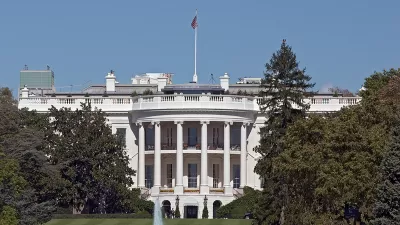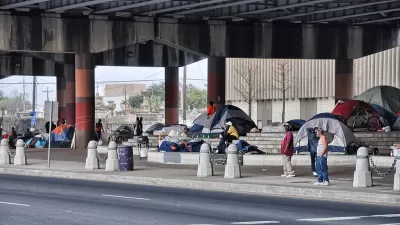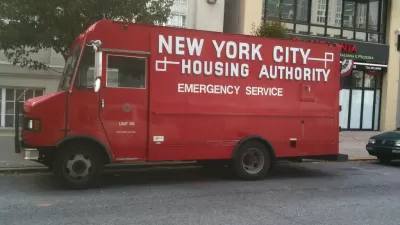Shortly after a tumultuous visit to California focusing on the homelessness crisis in San Francisco and Los Angeles, Trump administration has released a report on homelessness that is already facing criticism.

The Council of Economic Advisors (CEA), which works in the Executive Branch and advises the president on economic policy, has published a new "State of Homelessness in America" [pdf] report that blames the growing homeless crisis in the county on "decades of misguided and faulty policies."
The report emerged in context of a highly contentious visit by members of the Trump administration, including President Trump, to California. The president's parting message: that the U.S. EPA would slap the state with an environmental violation the state implements the president's prescriptions to clean up homelessness (this during the same week as the federal government revoking the state's Clean Air Act waiver).
The president also announced a planned crackdown on homelessness, and Housing and Urban Development Secretary Ben Carson found controversy by reportedly using offensive terms to describe transgender homeless people. Criticism of the visit and the report, from sources reported by Liam Dillon and Benjamin Oreskes for the Los Angeles Times, was swift and thorough.
Critics describe the Trump administration's emerging doctrine on reducing regulations to spur the housing as distinct from the views of the state's socially progressive YIMBY politicians. Some think the president is actually just trolling the state, in fact. Other experts also say the administration's hopes for deregulation to move the needle on homelessness are overstated. There are other differences too, like the report's call for a greater role for law enforcement in cracking down on homeless populations.
Kriston Capps also writes in-depth coverage of the report and the current state of affairs between the Trump administration and the state of California for CityLab, focusing on several of the aforementioned themes as well as another under-reported feature of the Trump doctrine on homelessness: Housing First skepticism.
"Their argument against Housing First relies on supply and demand. It’s a winding, five-part case that holds that by reducing the number of homeless people through programs that don’t set any preconditions or requirements for their participation, Housing First policies might generate outcomes that actually increase the homeless population," writes Capps.
FULL STORY: Trump’s big idea to fix homelessness is to do what California is already doing — sort of

Study: Maui’s Plan to Convert Vacation Rentals to Long-Term Housing Could Cause Nearly $1 Billion Economic Loss
The plan would reduce visitor accommodation by 25,% resulting in 1,900 jobs lost.

North Texas Transit Leaders Tout Benefits of TOD for Growing Region
At a summit focused on transit-oriented development, policymakers discussed how North Texas’ expanded light rail system can serve as a tool for economic growth.

Using Old Oil and Gas Wells for Green Energy Storage
Penn State researchers have found that repurposing abandoned oil and gas wells for geothermal-assisted compressed-air energy storage can boost efficiency, reduce environmental risks, and support clean energy and job transitions.

Private Donations Propel Early Restoration of Palisades Playground
Los Angeles has secured over $1.3 million in private funding to restore the Pacific Palisades playground months ahead of schedule, creating a modern, accessible space that supports community healing after recent wildfires.

From Blight to Benefit: Early Results From California’s Equitable Cleanup Program
The Equitable Community Revitalization Grant (ECRG) program is reshaping brownfield redevelopment by prioritizing projects in low-income and environmental justice communities, emphasizing equity, transparency, and community benefits.

Planting Relief: Tackling Las Vegas Heat One Tree at a Time
Nevada Plants, a Las Vegas-based nonprofit, is combating the city’s extreme urban heat by giving away trees to residents in underserved neighborhoods, promoting shade, sustainability, and community health.
Urban Design for Planners 1: Software Tools
This six-course series explores essential urban design concepts using open source software and equips planners with the tools they need to participate fully in the urban design process.
Planning for Universal Design
Learn the tools for implementing Universal Design in planning regulations.
Ascent Environmental
Borough of Carlisle
Institute for Housing and Urban Development Studies (IHS)
City of Grandview
Harvard GSD Executive Education
Toledo-Lucas County Plan Commissions
Salt Lake City
NYU Wagner Graduate School of Public Service





























